Hot Topics
Simona Halep Ends Collaboration With Mouratoglou, Likely To Retire if Doping Appeal Fails
Published
5 months agoon
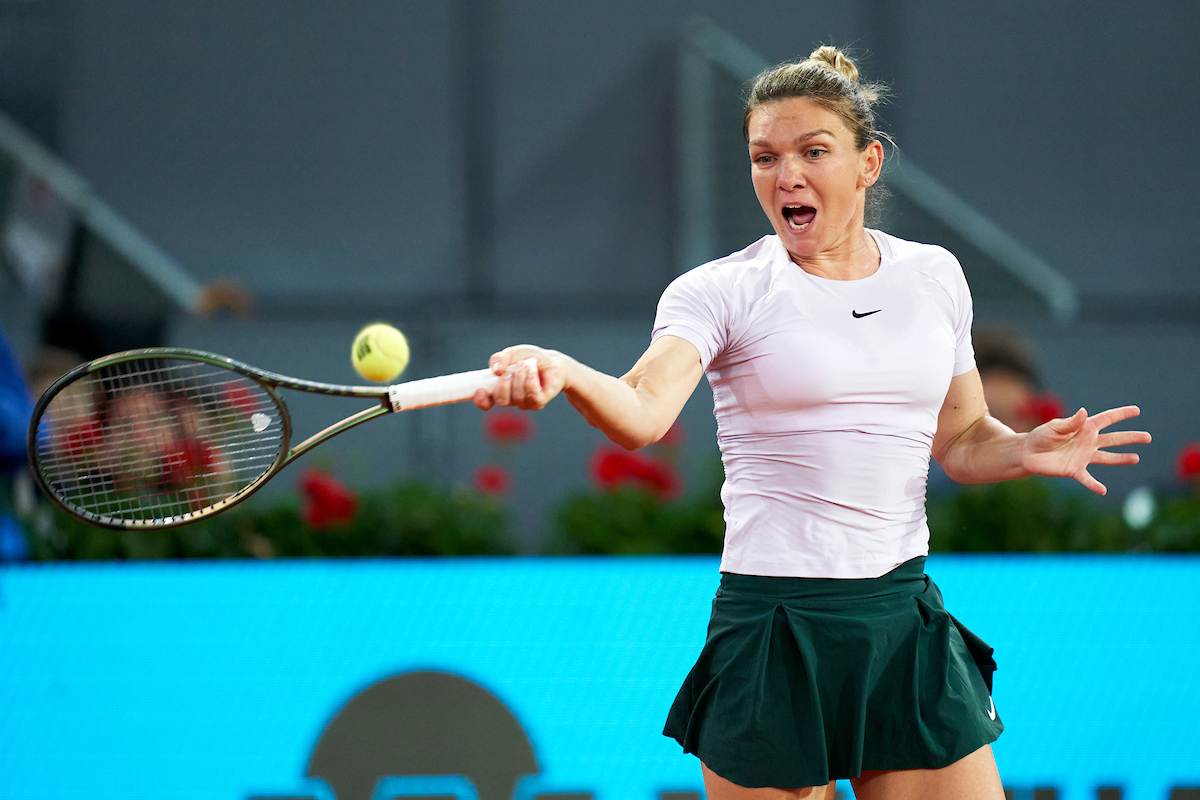
Simona Halep says she has cut ties with tennis coach Patrick Mouratoglou and his academy in the wake of her four-year doping ban.
The former world No.1 is set to appeal against her ban during a three-day hearing at the Court of Arbitration for Sport (CAS) after an independent tribunal determined that the Romanian had committed intentional anti-doping violations. In a 126-page report by the International Tennis Integrity Agency (ITIA), investigators accepted that a collagen supplement taken by Halep – called Keto MCT – was contaminated with the banned substance Roxadustat “on the balance of probability.” However, they stated that there must have been another source of Roxadustat based on the level detected in her sample taken during the 2022 US Open.
Furthermore, three experts in the area said they have ‘a high degree of confidence‘ that there was not an ‘innocent explanation’ for the abnormalities detected in Halep’s Athlete’s Biological Passport (ABP). They reported that ‘likely doping’ occurred based on an analysis of 51 valid samples of Halep’s blood and rejected her explanation for the irregularity. The tennis star cited blood loss during surgery and spells when she was inactive as her defence.
Halep has always maintained her innocence throughout and insists that she would never deliberately take banned substances. Now in a new interview with Romania’s Euronews, she has taken a swipe at former coach Mouratoglou who was the person who recommended that she take the contaminated supplement. Mouratoglou, who has also worked with the likes of Serena Williams and Holger Rune, said he feels responsible for the incident but had no idea that the supplement contained traces of Roxadustat.
“Indeed, it came out publicly (Mouratoglou’s comment on the matter). I wish he had done this a little sooner,” the Romania Journal quoted Halep as telling Euronews.
“It was hard for me because I always trusted my teams, previous teams and everyone I work with. I always had confidence, and my confidence is now a little shaken.” She added.
Halep’s future in the sport now depends on the CAS who is scheduled to hold her hearing between February 7-9, 2024. If she is unsuccessful in her bid to overturn her ban, the two-time Grand Slam champion admits that there is a strong chance she will retire from tennis.
“More than a year has already passed, and every day I felt it very painfully, full of emotions.” She said.
“It was a shock to me when I received the letter that my urine test, only my urine test, was positive. I know I haven’t done anything wrong and I know I’m clean. I have always been against doping.’
“Four years is a long time at my age. If it’s four years, I don’t know how I’ll manage. It will probably be the end of my career. Yes. And for something I didn’t do and isn’t my fault, it’s even more catastrophic.”
Halep, who is 32, has won 24 WTA titles during her career and has been runner-up at 18 other tournaments. She has also earned more than $40M in prize money and recorded over 550 Tour-level victories.
You may like
-


Caroline Wozniacki’s Father Criticises WTA For Lack Of Help For Mothers On Tour
-


Steve Flink: The 2024 Italian Open Was Filled with Surprises
-


Alexander Zverev Secures Return To Top Four After Winning Italian Open
-


In-Form Iga Swiatek Not Taking Anything For Granted Ahead of French Open Title Defence
-


Iga Swiatek Demolishes Aryna Sabalenka To Seal Third Rome Title
-


Internazionali d’Italia Daily Preview: Sascha Zverev Plays Nicolas Jarry for the Men’s Singles Championship
Focus
Caroline Wozniacki’s Father Criticises WTA For Lack Of Help For Mothers On Tour
Caroline Wozniacki was not given a wildcard for Rome or Roland Garros.
Published
1 day agoon
20/05/2024
Piotr Wozniacki has labelled the WTA as ‘amateur’ for their treatment of mothers on tour as he claims that Caroline Wozniacki should have had more wildcards.
The former Australian Open champion has played ten events since she announced her comeback last year.
Wozniacki has recovered her ranking to 117 in the world and her comeback has resulted in a fourth round appearance at the US Open as well as a quarter-final result at Indian Wells.
However the Dane has not been successful in gaining wildcards recently with both Rome and Roland Garros not offering Wozniacki one.
It’s a decision that Wozniacki’s father, Piotr, has not been happy with as he explained with Sport.PL, “The WTA believes that it is operating in an amateur fashion in the world of the largest professional women’s sport of all sports in the world. They sign contracts with the players and the players are obliged to do certain things under these contracts. And what do they get? Nothing, really nothing!” Piotr was quoted by tennisuptodate as saying.
“All wild cards, and there were 8 of them, were given to the Italians. I understand promoting their players, but how can you give the right to play in a tournament of this rank to such girls who should not even think that they could play in a Masters yet?
“Caroline was number one in her ranking. She won a Grand Slam tournament, won the Masters, played in almost 60 finals of their tournaments and won 30. So we are talking about a complete tennis player, someone who did a great job, who certainly increased the popularity of tennis, who earned a lot of money herself, but let them earn money. even much more.
“And it turns out that when someone like Caroline Wozniacki comes back as Caroline Wozniacki and family, she is no longer welcome. We can’t even prepare Caroline’s starting plan! We train, we prepare, and it turns out that there is nothing to do.
“This is happening because today in tennis everything is based only on relationships, on acquaintances, and not on clear rules. The thing is that if we know the organizers or tournament directors, we get a chance to play, but if we don’t know someone somewhere, they don’t want us there.
“Naturally, after the maternity break, my daughter had zero points. It takes a lot of time to start from scratch and reach the top, but we would do it patiently, but how can we do it when you don’t let a girl like that work for it? The rules in tennis today are such that there is no longer a mandatory wild card for someone who was once in the top 20, had a long break and came back.
“This card was really helpful for tennis players coming back after having a baby and for those coming back from serious injuries. And now Caroline, Angelique Kerber or Naomi Osaka are dependent only on someone else’s decisions. Since last year, all wild cards are the property of the tournaments, and the WTA washes its hands of them.”
It’s clear the Wozniacki family is disappointed as the Dane could be set to cancel her comeback next year.
However there is optimism that Wozniacki will receive one at Wimbledon as she has had past success on grass courts.
Hot Topics
Steve Flink: The 2024 Italian Open Was Filled with Surprises
Published
1 day agoon
20/05/2024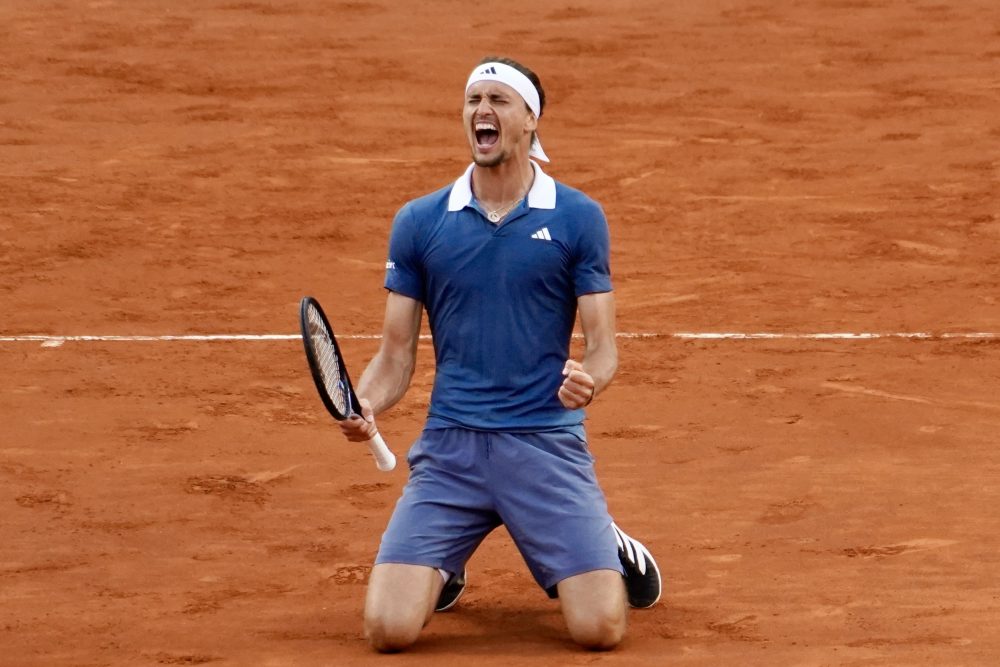
In sweeping majestically to his sixth career Masters 1000 title along with a second crown at the Italian Open in Rome, Germany’s Sascha Zverev put on one of the most self assured performances of his career to cast aside the Chilean Nicolas Jarry 6-4, 7-5 in the final. By virtue of securing his 22nd career ATP Tour title and his first of 2024, Zverev has moved from No. 5 up to No. 4 in the world. That could be crucial to his cause when he moves on to Roland Garros as the French Open favorite in the eyes of some experts.
Zverev is long overdue to win a major title for the first time in his storied career. Not only has he won those six tournaments at the elite 1000 level, but twice— in 2018 and 2021—he has triumphed at the prestigious, year end ATP Finals reserved solely for the top eight players in the world. This triumph on the red clay of Rome is a serious step forward for the 27-year-old who has demonstrably been as prodigious on clay as he is on hard courts.
Seldom if ever have I seen a more supreme display of serving in a final round skirmish on clay than what Zverev displayed against Jarry on this occasion. He never faced a break point and was not even pushed to deuce. Altogether, Zverev took 44 of his 49 service points across the two sets in his eleven service games. He won 20 of 21 points on his deadly delivery in the first set and 24 of 28 in the second. He poured in 80% of his first serves and managed half a dozen aces and countless service winners. His power, precision and directional deception was extraordinary.
Although the scoreline in this confrontation looks somewhat close, that was not the case at all. Jarry was thoroughly outplayed by Zverev from the backcourt, and despite some stellar serving of his own sporadically, he could not maintain a sufficiently high level. He did manage to win 78% of his first serve points, but Jarry was down at 35% on second serve points won. In the final analysis, this was a final round appointment that was ultimately a showcase for the greatness of Zverev more than anything else. Jarry was too often akin to a spectator at his own match as Zverev clinically took him apart.
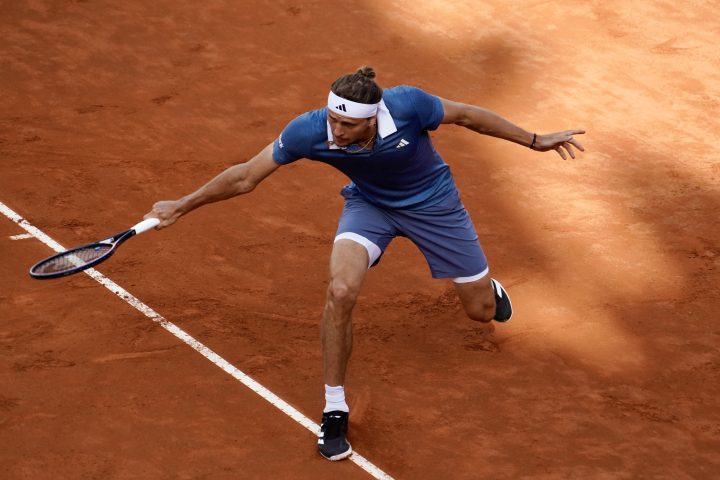
Zverev and Jarry arrived in the final contrastingly. The German’s journey to the title round was relatively straightforward. After a first round bye, he handled world No. 70 Aleksandar Vukic. Zverev dismissed the Australian 6-0, 6-4. The No. 3 seed next accounted for Italy’s Luciano Darderi 7-6 (3), 6-2. In the round of 16, Zverev comfortably disposed of Portugal’s Nuno Borges, ousting the world No. 53 by scores of 6-2, 7-5. Perhaps Zverev’s finest match prior to the final was a 6-4, 6-3 quarterfinal dissection of Taylor Fritz, a much improved player on clay this season. Zverev did not face a break point in taking apart the 26-year-old 6-4, 6-3 with almost regal authority from the backcourt.
Only in the penultimate round was Zverev stretched to his limits. Confronting the gifted Alejandro Tabilo of Chile, he was outplayed decidedly in the first set against the left-hander. The second set of their semifinal was on serve all the way, and the outcome was settled in a tie-break. With Tabilo apprehensive because he was on the verge of reaching the most important final of his career, Zverev was locked in. After commencing that sequence with a double fault, Zverev fell behind 0-2 but hardly put a foot out of line thereafter.
He did not miss a first serve after the double fault and his ground game was unerring. Zverev took that tie-break deservedly 7-4, and never looked back, winning 16 of 19 service points, breaking an imploding Tabilo twice, and coming through 1-6, 7-6 (4), 6-2. Zverev displayed considerable poise under pressure late in the second set to move past a man who had produced a startling third round upset of top seeded Novak Djokovic.
As for Jarry, the dynamic Chilean had a first round bye as well, and then advanced 6-2, 7-6 (6) over the Italian Matteo Arnaldi. Taking on another Italian in the third round, Jarry survived an arduous duel with Stefano Napolitano 6-2, 4-6, 6-4. He then cast aside the Frenchman Alexandre Muller 7-5, 6-3.
Around the corner, trouble loomed. Jarry had to fight ferociously to defeat No. 6 seed Stefanos Tsitsipas, who had by then established himself in the eyes of most astute observers as the tournament favorite. Tsitsipas has been revitalized since securing a third crown in Monte Carlo several in April. And in his round of 16 encounter, the Greek competitor had looked nothing less than stupendous in routing the Australian Alex de Minaur 6-1, 6-2.
Unsurprisingly, Tsitsipas seemed in command against Jarry in their stirring quarterfinal. He won the first set and had two big openings in the second. Jarry served at 3-3, 0-40. Tsitsipas missed a lob off the backhand by inches on the first break point before Jarry unleashed an ace followed by a service winner. The Chilean climbed out of that corner and got the hold. Then, at 5-5, Tsitsipas reached double break point at 15-40 but once more he was unable to convert. He got a bad bounce on the first break point that caused him to miss a forehand from mid-court. On the second, Jarry’s forehand down the line was simply too good.
Now serving at 5-6, Tsitsipas had not yet been broken across two sets. One more hold would have taken him into a tie-break and given him a good chance to close the account. But Tsitsipas won only one point in that twelfth game and a determined Jarry sealed the set 7-5.
Nonetheless, Tsitsipas moved out in front 2-1 in the third set, breaking serve in the third game. Jarry broke right back. Later, Tsitsipas served to stay in then match at 4-5 in that final set. He fought off three match points but a bold and unrelenting Jarry came through on the fourth to win 3-6, 7-5, 6-4. That set the stage for a semifinal between Jarry and a surging Tommy Paul, fresh from back to back upset wins over Daniil Medvedev and Hubert Hurkacz.
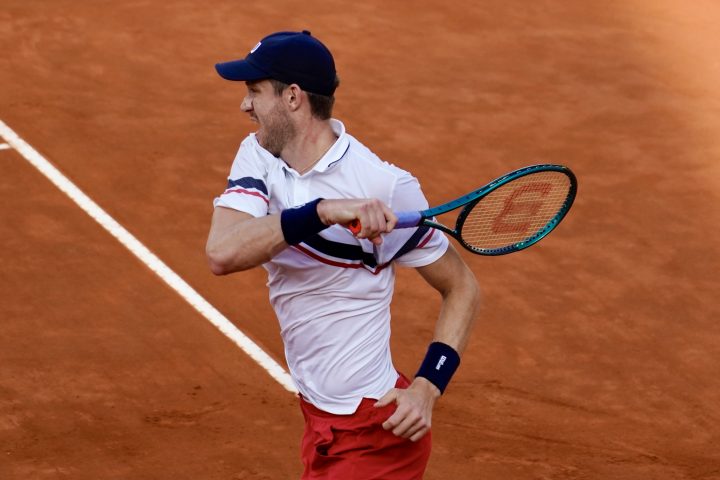
Jarry and Paul put on a sparkling show. Jarry took the opening set in 42 minutes, gaining the crucial service break for 5-3 and serving it out at 15 with an ace out wide. When Jarry built a 4-2 second set lead, he seemed well on his way to a straight sets triumph. But Paul had broken the big serving Hurkacz no fewer than seven times in the quarters. He is a first rate returner. The American broke back for 4-4 against Jarry and prevailed deservedly in a second set tie-break 7-3 after establishing a 4-0 lead.
Briefly, the momentum was with Paul. But not for long. Jarry saved a break point with an overhead winner at 2-2 in the final set, broke Paul in the next game, and swiftly moved on to 5-2. At 5-3, he served for the match and reached 40-0. But he missed a difficult forehand pass on the first match point and Paul then released a backhand down the line winner and a crosscourt backhand that clipped the baseline and provoked a mistake from Jarry.
The Chilean cracked an ace to garner a fourth match point, only to net a backhand down the line volley that he well could have made. A resolute Paul then advanced to break point but Jarry connected with a potent first serve to set up a forehand winner. The American forged a second break point opportunity but Jarry erased that one with a scorching inside in forehand that was unanswerable. Another ace brought Jarry to match point for the fifth time, and this one went his way as Paul rolled a forehand long. Jarry was victorious 6-3, 6-7 (3), 6-3.
Meanwhile, while all of the attention was ultimately focussed on the two finalists, it was on the first weekend of the tournament that the two dominant Italian Open champions of the past twenty years were both ushered out of the tournament unceremoniously. First, Rafael Nadal, the ten-time champion in Rome, was beaten 6-1, 6-3 in the third round by Hurkacz as he competed in his third clay court tournament since coming back in April at Barcelona.
He had lost his second round match in Barcelona to De Minaur. In his next outing at Madrid, Nadal avenged that loss to the Australian and managed to win three matches altogether before he was blasted off the court by the big serving and explosive groundstrokes of Jiri Lehecka. In Rome, the Spaniard won one match before his contest with Hurkacz. The first two games of that showdown lasted 27 minutes. Nadal had five break points in the opening game and Hurkacz had two in the second game. Neither man broke and so it was 1-1.
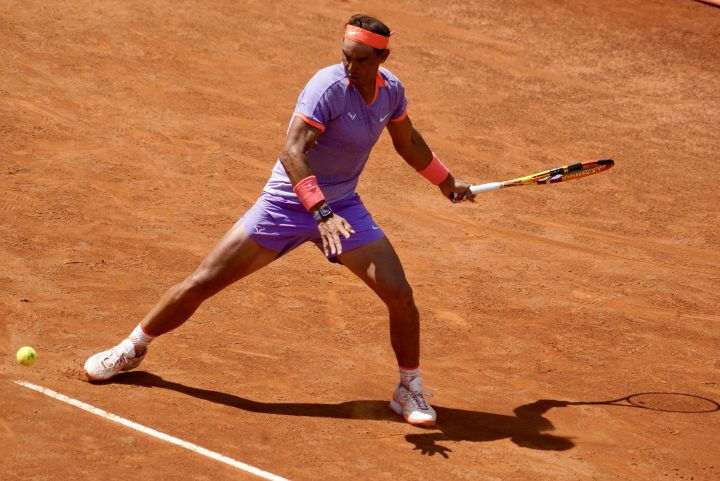
A hard fought and long encounter seemed almost inevitable, but the Polish 27-year-old swept five games in a row to take that first set, saving two more break points in the seventh game. He was mixing up his ground game beautifully, hitting high trajectory shots to keep Nadal at bay and off balance, then ripping flat shots to rush the Spaniard into errors. In the second set, Hurkacz broke early and completely outclassed Nadal. He also served him off the court, winning 16 of 17 points on his devastatingly effective delivery. With one more break at the end, Hurkacz surged to a 6-1, 6-3 triumph.
A day later, Djokovic, the six-time Italian Open victor, met Tabilo in his third round contest. Djokovic had played well in his second round meeting against the Frenchman against Corentin Moutet to win 6-3, 6-1. But afterwards, Djokovic was hit in the head by a water bottle while signing autographs. He had the next day off but when he returned to play Tabilo, the Serbian was almost unrecognizable. Beaten 6-2, 6-3, Djokovic never even reached deuce on the Chilean’s serve. On top of that, Djokovic, broken four times in the match, double faulted on break point thrice including at set point down in the first set and when he was behind match point in the second. Tabilo was terrific off the ground and on serve, but Djokovic was listless, lacking in purpose and seemingly disoriented. Some astute observers including Jim Courier thought Djokovic might have suffered a concussion from the freakish water bottle incident, but he did tests back in Serbia which indicated that was not the case.
Now Djokovic has decided to give himself a chance— if all goes according to plan— to potentially play a string of much needed matches at the ATP 250 tournament in Geneva this week. All year long, he has played only 17 matches, winning 12 of those duels. But nine of those contests were at the beginning of the season in Australia. Since then, he has played only eight matches. On the clay, he went to the semifinals in Monte Carlo where he benefitted from four matches, but he skipped Madrid and hoped to find his form again in Rome.
Realizing that losing in the third round there left him not only lacking in match play but not up to par in terms of confidence as well, Djokovic will try to make amends in Geneva. A good showing in that clay court tournament— either winning the tournament or at least making the final—would send the Serbian into Roland Garros feeling much better about his chances to win the world’s premier clay court championship for the third time in four years and the fourth time overall in his career.
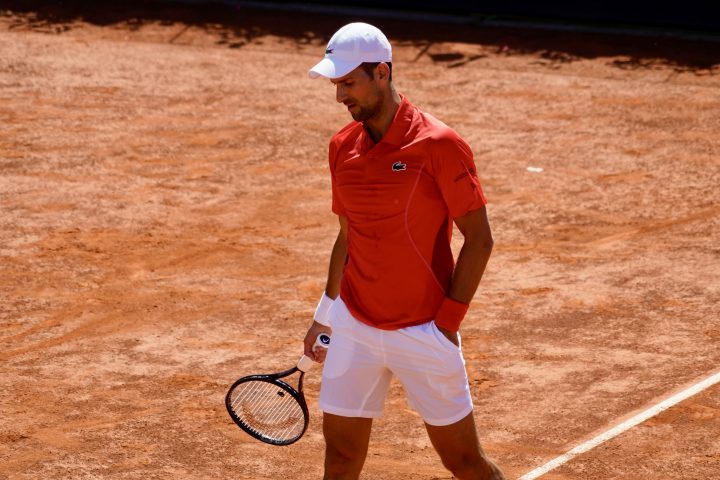
How do the other favorites stack up? It is awfully difficult to assess either Carlos Alcaraz or Jannik Sinner. Alcaraz missed Monte Carlo and Barcelona and probably rushed his return in Madrid, losing in the high altitude to Andrey Rublev in the quarterfinals. Then he was forced to miss Rome. He is clearly underprepared. As for Sinner, he played well in Monte Carlo before losing a semifinal to Tsitsipas. He advanced to the quarterfinals of Madrid but defaulted against Felix Auger-Aliassime with a hip injury.
Will Alcaraz and Sinner be back at full force in Paris? I have my doubts, but the fact remains that Sinner has been the best player in the world this year, capturing his first major in Melbourne at the Australian Open, adding titles in Rotterdam and Miami, and winning 28 of 30 matches over the course of the season. Alcaraz broke out of a long slump to defend his title at Indian Wells, but missing almost all of the clay court circuit en route to Rome has surely disrupted his rhythm.
I would make Zverev the slight favorite to win his first Grand Slam tournament at Roland Garros. If Djokovic can turn things around this week and rekindle his game, there is no reason he can’t succeed at Roland Garros again. I make him the second favorite. Out of respect for Alcaraz’s innate talent and unmistakable clay court comfort, I see him as the third most likely to succeed with Sinner close behind him. But that is assuming they are fit to play and fully ready to go.
Tsitsipas and Casper Ruud must be taken seriously as candidates for the title in Paris. Tsitsipas upended Medvedev and Zverev in 2021 to reach the Roland Garros final, and then found himself up two sets to love up against Djokovic before losing that hard fought battle in five sets. Ruud has been to the last two French Open finals, bowing against Nadal in 2022 and Djokovic a year ago. They started this clay court season magnificently, with Tsitsipas defeating Ruud in the Monte Carlo final and Ruud reversing that result in the final of Barcelona. Both men figure to be in the thick of things this time around at Roland Garros.
Where does Nadal fit into this picture? He will surely be more inspired at his home away from home than he was in his three other clay court tournaments leading up to Roland Garros, but it will take a monumental effort for the 14-time French Open victor to rule again this time around. With a decent draw, he could get to the round of 16 or perhaps the quarterfinals, but even that will be a hard task for him after all he has endured physically the last couple of years. Nadal turns 38 on June 3. If he somehow prevails once more in Paris, it would be the single most astonishing achievement of his sterling career.
The battle for clay court supremacy at Roland Garros will be fierce. The leading contenders will be highly motivated to find success. The defending champion will be in full pursuit of a 25th Grand Slam title. Inevitably, some gifted players will be ready to emerge, and others will be determined to reemerge. I am very much looking forward to watching it all unfold and discovering who will be the last man standing at the clay court capital of the world.
NOTE: All photos via Francesca Micheli/Ubitennis
Hot Topics
Alexander Zverev Secures Return To Top Four After Winning Italian Open
Published
2 days agoon
19/05/2024
Alexander Zverev has clinched his first Masters title since 2021 after downing Nicolas Jarry in straight sets at the Italian Open.
The world No.5 surged to a 6-4,7-5, victory at the Faro Italico to become the 10th player in the Open Era to win the Rome trophy on multiple occasions. He also won the tournament in 2017. Zverev’s latest win was aided by an impressive service display from the 27-year-old who also hit 15 winners against eight unforced errors. He is now 22-1 against players ranked outside the top five at the tournament with his only loss being to Matteo Berrettini five years ago.
“It means a lot. Winning my first (Masters) title and winning my first after my injury in Rome. Rome is a very special place for me,” the new champion said afterwards.
“I said at the beginning of the week if Rome is the place of firsts for me I’m extremely happy about it. It’s a very special week.”
Playing in his first Masters 1000 final since 2022, Zverev produced a serving masterclass throughout the opening set with the German winning 20 out of 21 points. In contrast, Jarry experienced more difficult but valiantly fought back with the Chilean saving two straight break points at 4-4. Eventually, the third seed sealed the opener two games later with the help of some costly shots coming from across the court. A deep shot towards the baseline was unsuccessfully returned by Jarry, handing Zverev a set point which he converted.
Continuing to pile the pressure on in the second set, Zverev had a double chance to break for a 3-1 lead but failed to capitalise on that opportunity. The opportunities continued to come and go. Back-to-back double faults from Jarry at 4-5 handed Zverev two championship points but once again he failed to take advantage. Eventually, he sealed victory two games later with the help of a forehand shot that Jarry returned out. Prompting Zverev to raise his hands in delight before later paying tribute to his rival.
“He’s playing huge. You can see that by the opponents he beat and how he beat them,” he said of Jarry.
“I told him if he continues playing like that he is going to have many more chances. I’m happy to be the winner.”
As a result of his Rome triumph, Zverev has secured a top-four seeding for the French Open. On Monday he will rise in the PIF ATP rankings to No.4 which will be his highest position since August 2022. During that same year, he sustained a serious ankle injury which sidelined him for months.
“The focus is on Paris, that’s for sure. but let me enjoy this one for a day or so and then I will have my full focus on Paris,” said Zverev.
Zverev has now won six Masters 1000 titles which places him in joint-ninth on the all-time list along with Daniil Medvedev.

Caroline Wozniacki’s Father Criticises WTA For Lack Of Help For Mothers On Tour

Steve Flink: The 2024 Italian Open Was Filled with Surprises

Alexander Zverev Secures Return To Top Four After Winning Italian Open

In-Form Iga Swiatek Not Taking Anything For Granted Ahead of French Open Title Defence

Iga Swiatek Demolishes Aryna Sabalenka To Seal Third Rome Title

Ex-No.2 Paula Badosa Vows To Continue Career Despite Back Injury

Ons Jabeur Explains Partnership With Ex-No.7 Verdasco In Madrid

Alexander Zverev Pays Tribute To Retiring Thiem After Rome Win

British BJK Captain Keothavong Criticises Emma Raducanu’s Madrid Open Performance

Erratic Novak Djokovic Booed Off Court After Shock Italian Open Defeat

VIDEO EXCLUSIVE: Danielle Collins Triumphs In Miami As Elena Rybakina Pays The Price For Three Set Marathons

VIDEO EXCLUSIVE: Who Is The Better Player Between Jannik Sinner And Carlos Alcaraz?

(VIDEO) Miami Open Women’s Draw Preview: Is Iga Swiatek Unbeatable?

(VIDEO) Miami Open Men’s Draw Preview: Can Jannik Sinner Bounce Back?

(VIDEO) Carlos Alcaraz Reigns Supreme At Indian Wells, Continues Rivalry With Jannik Sinner
Trending
-

 Focus1 day ago
Focus1 day agoCaroline Wozniacki’s Father Criticises WTA For Lack Of Help For Mothers On Tour
-

 Hot Topics2 days ago
Hot Topics2 days agoIn-Form Iga Swiatek Not Taking Anything For Granted Ahead of French Open Title Defence
-

 Hot Topics2 days ago
Hot Topics2 days agoAlexander Zverev Secures Return To Top Four After Winning Italian Open
-

 Hot Topics1 day ago
Hot Topics1 day agoSteve Flink: The 2024 Italian Open Was Filled with Surprises

